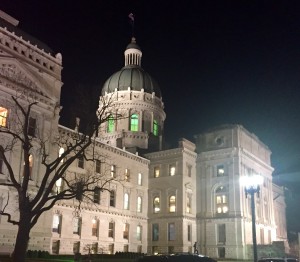Supplemental Pay And Voucher Expansion Still Alive In Session

The legislature continues to discuss education bills during the 2016 legislative session. (photo credit: Claire McInerny/StateImpact Indiana)
Language that would allow school districts to give teacher’s bonuses outside of their negotiations with a teacher union made its way back into legislation during the final days of the 2016 legislative session.
Two earlier bills would have given teachers supplemental pay outside of collective bargaining. Both died after criticism from teacher unions and educators.
But a new conference committee report for HB 1005 includes language that gives advanced placement teachers the opportunity to earn a raise outside of collective bargaining. It aims to do something slightly different from the plans in the two previous bills.
Those bills allowed schools to negotiate pay increases for teachers in hard to fill positions without engaging teachers unions.
Teachers and educators argued that separate negotiating processes might pit teachers against one another.
Rep. Bob Behning, R-Indianapolis, says including language that gives advanced placement teachers the opportunity to earn a raise outside of collective bargaining isn’t a sneaky way to bring that language back.
“What is 1005 is exactly the same language that passed the General Assembly for dual credit teachers. We’re just aligning the both of them together,” he says.
Current law says dual credit teachers can receive a bonus outside of collective bargaining.
The House passed the conference committee report 51-43. (Check the full roll of the vote in the House.)
HB 1005 also includes language that allows students using choice scholarships, or school vouchers, to enroll in the program throughout the year. This means the state could see an increase in students using vouchers for private schools which would cost the state more money.
The bill must go through the Senate Rules committee and full Senate before heading to the governor.

